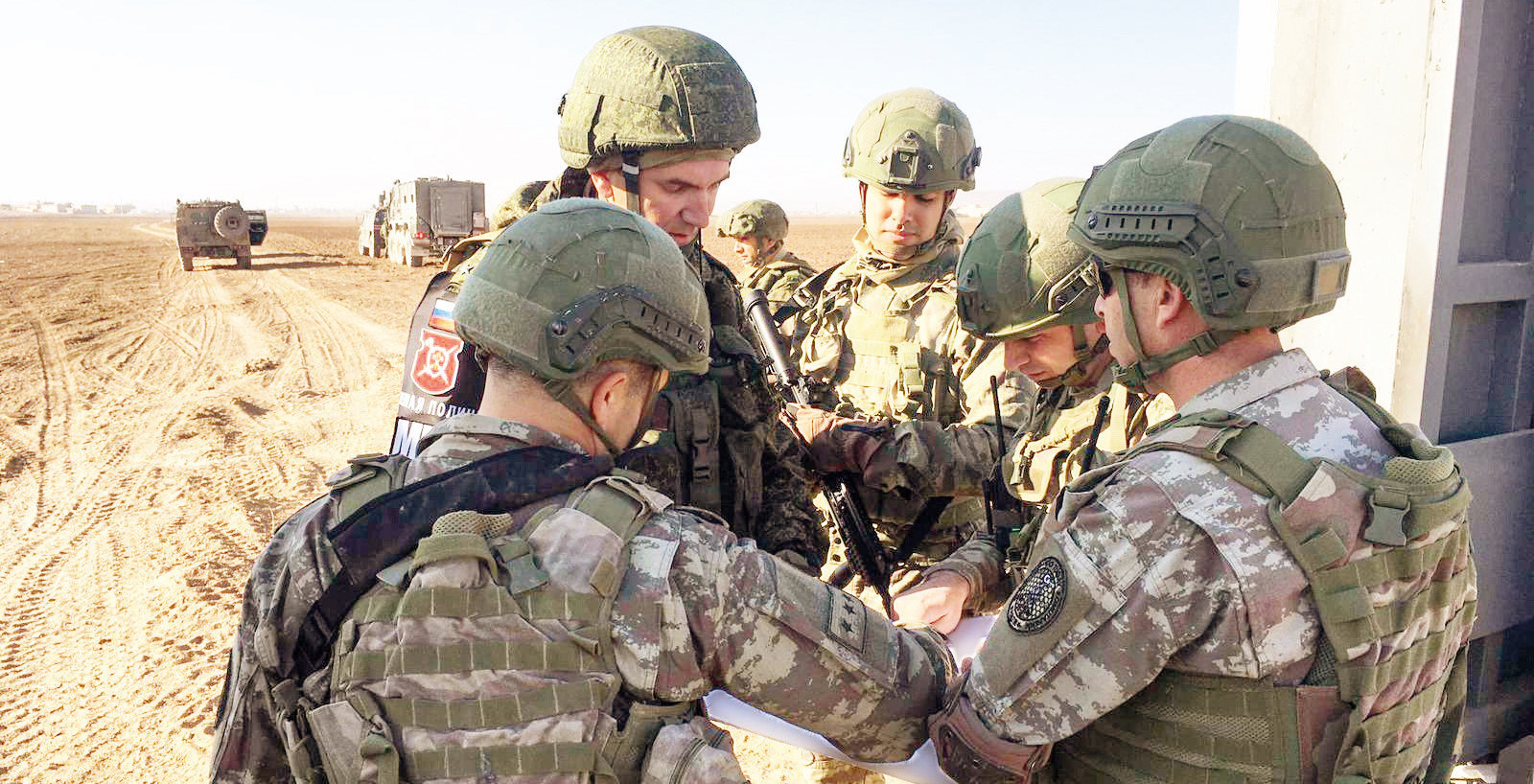Russia has failed to expel terrorists from the Kurdistan Workers Party (PKK) from the “safe zone” in northern Syria one month after the So
Russia has failed to expel terrorists from the Kurdistan Workers Party (PKK) from the “safe zone” in northern Syria one month after the Sochi agreement was reached, as Moscow appears to deploy the same stalling tactics previously adopted by Washington.
Ankara’s patience is quickly waning after Moscow has failed to keep its promise of pushing the YPG 30 kilometers from the border with Turkey as the terror group continues its occupation of several regions in northern Syria, all while maintaining a strong presence in the area with its heavy weapons.
The Russians settled in bases that the U.S. had evacuated in Sirrin, south of Ayn al-Arab, and were stationed the previous day at the base around the Tishrin Dam on the banks of the Euphrates River, where a senior Russian officer posed for a photograph with PKK/YPG ringleader Shervan Derviş, which then turned the incident into a handover ceremony between the Red Army-Pentagon-PKK.
Sharing the border in Qamishli with the Syrian regime and PKK, Russia did not even object to U.S. troops establishing a base in a village in Qamishli. Meanwhile, the U.S. army patrols with PKK terrorists in Derbasiyeh, Amuda, Malikiyeh and Qamishli, all of which fall within the scope of the agreement reached in Sochi, while Russia does not hesitate to form an alliance with the terrorist organization in other regions all while posing for patrol photos with the Turkish Armed Forces.
Turkey launched Operation Peace Spring on Oct. 9 to eliminate YPG/PKK terrorists from northern Syria in order to secure Turkey’s borders, aid in the safe return of Syrian refugees and ensure Syria’s territorial integrity.
The Russia-Turkey agreement struck in the Black Sea resort of Sochi in October endorses the return of Syrian President Bashar al-Assad’s forces to the border alongside Russian troops, replacing the Americans who had patrolled the region for years with their former YPG allies.
Under the pact between Russian President Vladimir Putin and Turkish President Tayyip Erdogan, the two countries said Russian military police and Syrian border guards would start removing the YPG 30 km (19 miles) from the Turkish border.
Ankara wants YPG/PKK terrorists to withdraw from the region so that a safe zone can be created to pave the way for the safe return of some 2 million refugees.
They formed a barrier to protect terrorists
Yet, Russia continues to make promises that it is failing to keep, reiterating its commitment to the deal, with Moscow saying on Friday that it was working “actively” to implement the memorandum reached with Turkey.
“We believe Russia will do its part and we hope that our partners will keep their word. We are working very actively on this,” said Russian Foreign Ministry spokeswoman Maria Zakharova.
However, the U.S.-backed PKK terror group in Syria has grown more reckless after sensing Russia’s protective shield over it.
Dozens of car bombs and mortar attacks target the Euphrates Shield and Peace Spring regions daily as PKK terrorists step up their attacks.
In one incident, the Russian army even sent troops to the flashpoint front line to protect the PKK in the town of Tal Tamr, which is covered in the Sochi agreement. To prevent the Syrian opposition from taking control of the town of Tal Tamr last week, the flag of Russia was raised on armored vehicles that paraded in the area. Once again, just as in Qamishli, a PKK-Regime-Russia alliance was forged.
‘We will do what is required again if need be’
The U.S. and Russia have not yet fulfilled the agreements signed with Ankara on northern Syria, Turkey’s foreign minister said Monday.
“If we do not obtain a result, we will do what is necessary, just as we launched the operation after trying with the U.S.,” Çavuşoğlu was quoted as saying, referring to work with Washington to remove the YPG from the area before Turkey launched its cross-border operation on Oct. 9.
Furthermore, during a meeting between Turkey and Russia south of Tal Abyad, General Staff officials shared information about the situation on the ground and requested that the PKK/YPG withdraw from the M4 highway in accordance with the agreement reached in Sochi.
The junction of Tal Tamr was requested to be cleared from the terrorist organization especially for the purpose of controlling the M4 highway.
It is said that Russia rejected these requests and increased support for the PKK in other regions, especially in Tal Tamr. It remains to be seen how these steps, which will negatively impact ties between Moscow and Ankara, will continue to develop in the coming days.
In its more than 30-year terror campaign against Turkey, the PKK — listed as a terrorist organization by Turkey, the U.S. and the EU — has been responsible for the deaths of 40,000 people, including women, children and infants. The YPG is the PKK’s Syrian offshoot.
